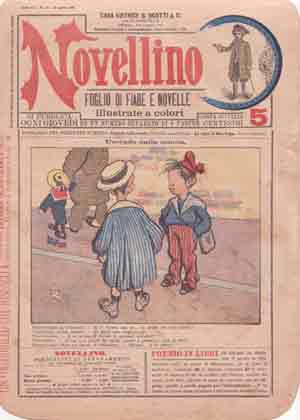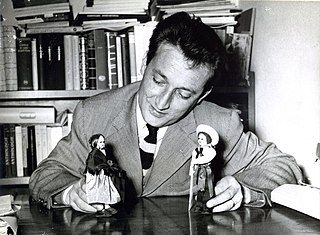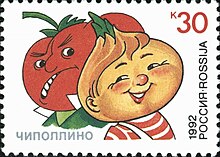
Italo Calvino was an Italian writer and journalist. His best-known works include the Our Ancestors trilogy (1952–1959), the Cosmicomics collection of short stories (1965), and the novels Invisible Cities (1972) and If on a winter's night a traveler (1979).

Palmiro Michele Nicola Togliatti was an Italian politician and statesman, leader of Italy's Communist party for nearly forty years, from 1927 until his death. Born into a middle-class family, Togliatti received an education in law at the University of Turin, later served as an officer and was wounded in World War I, and became a tutor. Described as "severe in approach but extremely popular among the Communist base" and "a hero of his time, capable of courageous personal feats", his supporters gave him the nickname il Migliore. In 1930, Togliatti renounced Italian citizenship, and he became a citizen of the Soviet Union. Upon his death, Togliatti had a Soviet city named after him. Considered one of the founding fathers of the Italian Republic, he led Italy's Communist party from a few thousand members in 1943 to two million members in 1946.

Italian comics, also known as fumetto, plural form fumetti, are comics that originate in Italy. The most popular Italian comics have been translated into many languages. The term fumetto refers to the distinctive word balloons that contain the dialogue in comics.

Alberto Pincherle, known by his pseudonym Alberto Moravia, was an Italian novelist and journalist. His novels explored matters of modern sexuality, social alienation and existentialism. Moravia is best known for his debut novel Gli indifferenti and for the anti-fascist novel Il conformista, the basis for the film The Conformist (1970) directed by Bernardo Bertolucci. Other novels of his adapted for the cinema are Agostino, filmed with the same title by Mauro Bolognini in 1962; Il disprezzo, filmed by Jean-Luc Godard as Le Mépris ; La noia (Boredom), filmed with that title by Damiano Damiani in 1963 and released in the US as The Empty Canvas in 1964 and La ciociara, filmed by Vittorio De Sica as Two Women (1960). Cédric Kahn's L'Ennui (1998) is another version of La noia.

Mario Scelba was an Italian politician and statesman who was the 33rd prime minister of Italy from February 1954 to July 1955. A founder of Christian Democracy (DC), Scelba was one of the longest-serving Minister of the Interior in the history of the republic, having served at the Viminale Palace in three distinct terms from 1947 to 1962.

The Italian Socialist Party was a social democratic and democratic socialist political party in Italy, whose history stretched for longer than a century, making it one of the longest-living parties of the country. Founded in Genoa in 1892, the PSI was from the beginning a big tent of Italy's political left and socialism, ranging from the revolutionary socialism of Andrea Costa to the Marxist-inspired reformist socialism of Filippo Turati and the anarchism of Anna Kuliscioff. Under Turati's leadership, the party was a frequent ally of the Italian Republican Party and the Italian Radical Party at the parliamentary level, while lately entering in dialogue with the remnants of the Historical Left and the Liberal Union during Giovanni Giolitti's governments to ensure representation for the labour movement and the working class. In the 1900s and 1910s, the PSI achieved significant electoral success, becoming Italy's first party in 1919 and during the country's Biennio Rosso in 1921, when it was victim of violent paramilitary activities from the far right, and was not able to move the country in the revolutionary direction it wanted.
José Cabrero Arnal or C. Arnal was a Spanish comics artist, who worked in France for most of his career but was never naturalized as French citizen. He is most famous for the comics series Pif le chien and Placid et Muzo.

Giovanni Francesco "Gianni" Rodari was an Italian writer and journalist, most famous for his works of children's literature, notably Il romanzo di Cipollino. For his lasting contribution as a children's author, he received the biennial Hans Christian Andersen Medal in 1970. He is considered as Italy's most important 20th-century children's author and his books have been translated into many languages, though few have been published in English.

Giovanni "Gianni" Meccia was an Italian composer, singer-songwriter, record producer and actor. He was often associated with Jimmy Fontana.

Massimo Bontempelli was an Italian poet, playwright, novelist and composer. He was influential in developing and promoting the literary styles known as magical realism and lombard line.
The Corriere dei Piccoli, later nicknamed Corrierino, was a weekly magazine for children published in Italy from 1908 to 1995. It was the first Italian periodical to make a regular feature of publishing comic strips.

Cipollino, or Little Onion as translated from the original, is a fictional character from Gianni Rodari's eponymous Tale of Cipollino, also known under its 1957 renamed title Adventures of Cipollino, a children's tale about political oppression. He also appeared before the publication of the book in the children's magazine Il Pioniere of which Rodari was the editor. Cipollino was popular in the Soviet Union, up to the point of being adapted as a ballet composed by Karen Khachaturian and choreographed by Henrich Mayorov, originally staged in Taras Shevchenko National Opera and Ballet Theatre of Ukraine on November 8, 1974.

Giovanni "Gianni" Cuperlo is an Italian politician, a member of the Italian Chamber of Deputies and former President of the Democratic Party.

Il Politecnico was a Communist cultural and literary magazine published in Milan, Italy, between 1945 and 1947. In the debut editorial it was stated that the magazine was inspired by the homonymous journal which had been founded by Carlo Cattaneo in 1839 and published until 1845. Although it was a short-lived publication, Il Politecnico was the most prominent magazine in Italy during its run.
Noi donne is a monthly feminist magazine published in Rome, Italy. It is one of the most significant feminist publications in the country.

Rinascita was a political and cultural magazine published in Rome, Italy, between 1944 and March 1991. It was one of the media outlets of Italian Communist Party (PCI).
Mario Pannunzio was an Italian journalist and politician. As a journalist he was the director in charge of the daily newspaper Risorgimento Liberale in the 1940s and of the weekly political magazine Il Mondo in the 1950s. As a politician he was a co-founder of the revived Italian Liberal Party in the 1940s and then of the Radical Party in 1955.
Il Marzocco was an Italian language weekly literary and art magazine which was published in Florence, Italy, between 1896 and 1932. The title was chosen by Gabriele D'Annunzio which was a reference to the symbol of the ancient Republic of Florence and also, of the popular rule. The magazine covered articles on a wide range of subjects such as women's rights and political events. Its subtitle was periodico settimanale di letteratura e d'arte.

Pattuglia was a weekly communist satirical magazine published between 1948 and 1953 in Milan, Italy. It was official media outlet of the youth organization of the Italian Communist Party. Its subtitle was il corriere dei giovani.













